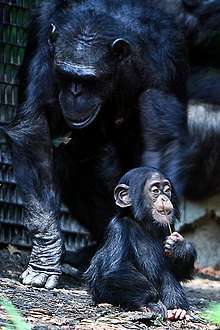
In the chimp you have sympathy between a mother and a child but you seldom find it anywhere else. Sympathy is a very, very human characteristic.
Jane Goodall
Jane Goodall
Chimpanzee, sometimes colloquially known as "chimp", is the common name for the two extant species of apes in the genus Pan. The Congo River forms the boundary between the native habitats of the two species:
- Common chimpanzee, Pan troglodytes (West and Central Africa)
- Bonobo, Pan paniscus (forests of the Democratic Republic of the Congo).
Quotes
- I cannot conceive of chimpanzees developing emotions, one for the other, comparable in any way to the tenderness, the protectiveness, tolerance, and spiritual exhilaration that are the hallmarks of human love in its truest and deepest sense.
- Jane Goodall, In the Shadow of Man (1971), p. 199.
- Humans have more sympathy. In the chimp you have sympathy between a mother and a child but you seldom find it anywhere else. Sympathy is a very, very human characteristic.
- Jane Goodall, quoted in "The Fascinating Chimpanzee", Awake!, 8 January 1985 pg. 27, citing an interview by WWF News (World Wildlife Fund)[specific citation needed]
- Studying chimps ‘has helped me to realize, perhaps more than anything else, just how different we are from them’.
- Jane Goodall, quoted in "The Fascinating Chimpanzee", Awake!, 8 January 1985 pg. 27, citing an interview by WWF News (World Wildlife Fund)[specific citation needed]
- The human brain is composed almost exclusively of the [cerebral] cortex. The brain of a chimpanzee, for example, also has a cortex, but in far smaller proportions. The cortex allows us to think, to remember, to imagine. Essentially, we are human beings by virtue of our cortex.
- Edoardo Boncinelli, director of research in molecular biology, Milan, Italy; as attributed by anonymous (Watch Tower Bible and Tract Society of Pennsylvania), Is There a Creator Who Cares About You? (1998).
- Children, behold the Chimpanzee,
He sits on the ancestral tree
From which we sprang in ages gone.
I'm glad we sprang; had we held on,
We might, for aught that I can say,
Be horrid chimpanzees today.- Oliver Herford, quoted in The Fireside Book of Humorous Poetry (Hamish Hamilton, 1965), p. 26.
- The Cerebral Cortex is the surface region of the brain that is most strongly linked to intelligence. A human’s cerebral cortex, if flattened, would cover four pages of typing paper; a chimpanzee’s would cover only one page; and a rat’s would cover a postage stamp.
- Scientific American.[specific citation needed]
- If chimpanzees can experience loneliness and mental anguish, it becomes more wrong to use them for experiments in which they are isolated and anticipate daily pain.
- Jeffrey Moussaieff Masson and Susan McCarthy, When Elephants Weep: The Emotional Lives of Animals (London: Vintage, 1996. ISBN 0-09-947891-9, Preface, p. 15.
External links
This article is issued from
Wikiquote.
The text is licensed under Creative
Commons - Attribution - Sharealike.
Additional terms may apply for the media files.